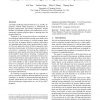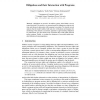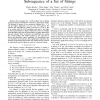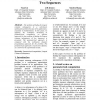54 search results - page 3 / 11 » A systematic approach to dynamic programming in bioinformati... |
OOPSLA
2010
Springer
13 years 4 months ago
2010
Springer
Accurately predicting program behaviors (e.g., locality, dependency, method calling frequency) is fundamental for program optimizations and runtime adaptations. Despite decades of...
ESORICS
2007
Springer
14 years 14 days ago
2007
Springer
Obligations are pervasive in modern systems, often linked to access control decisions. We present a very general model of obligations as objects with state, and discuss its interac...
POPL
2007
ACM
14 years 6 months ago
2007
ACM
A memory leak in a garbage-collected program occurs when the program inadvertently maintains references to objects that it no longer needs. Memory leaks cause systematic heap grow...
BIBE
2007
IEEE
14 years 20 days ago
2007
IEEE
—We investigate the k-LCS problem that is finding a longest common subsequence (LCS) for k given input strings. The problem is known to have practical solutions for k = 2, but f...
BIOCOMP
2006
13 years 7 months ago
2006
- The problem of finding the longest common subsequence is a well-known optimization problem because of its applications, especially in bioinformatics. In this paper, by applying t...




